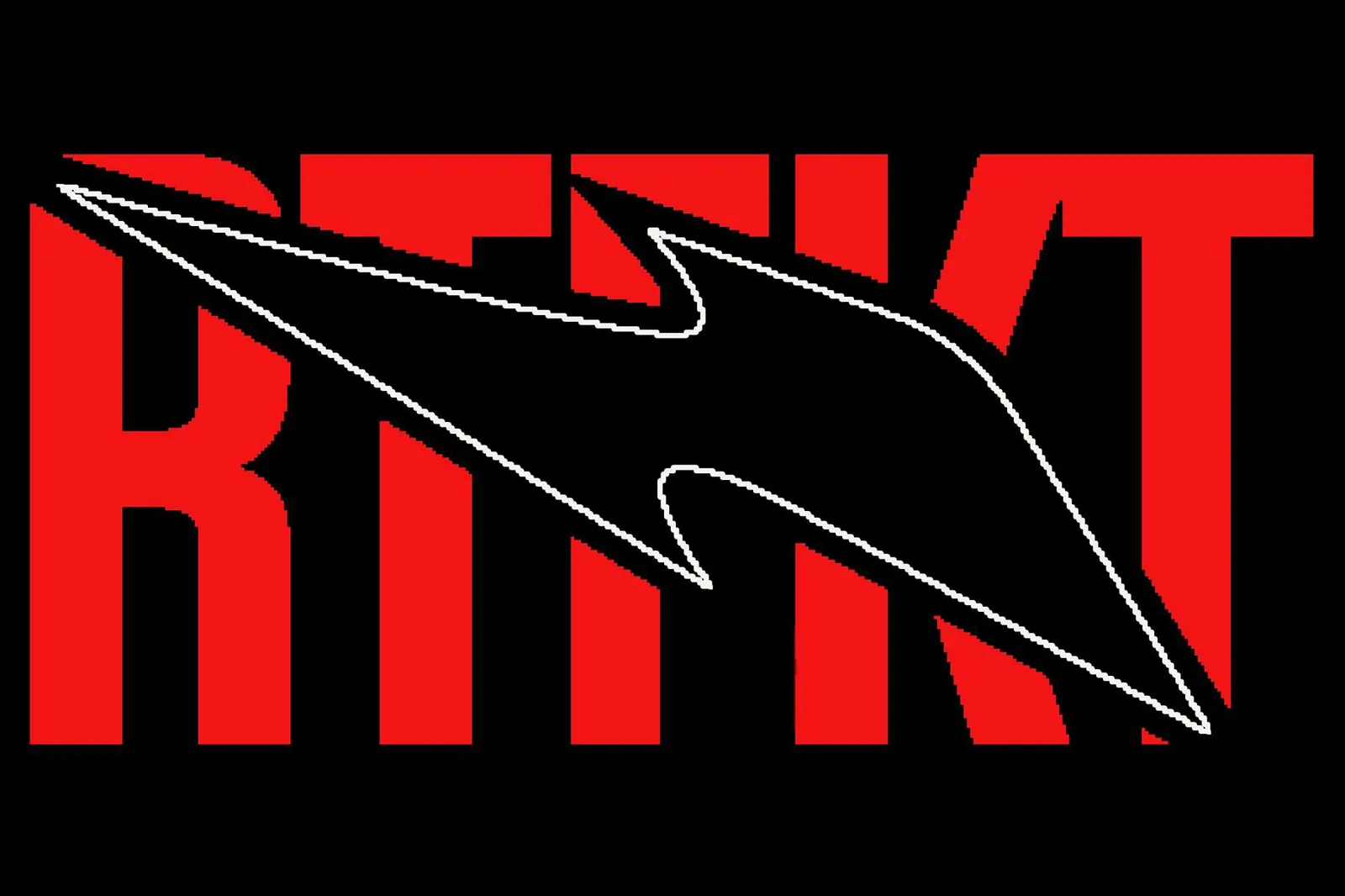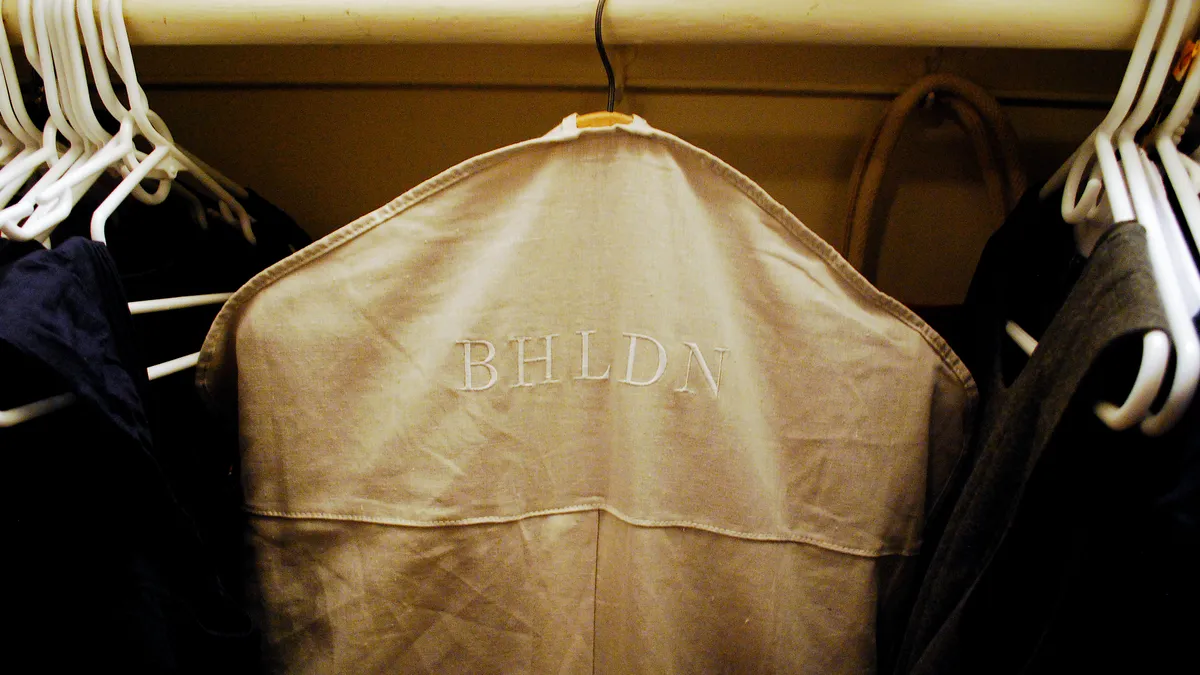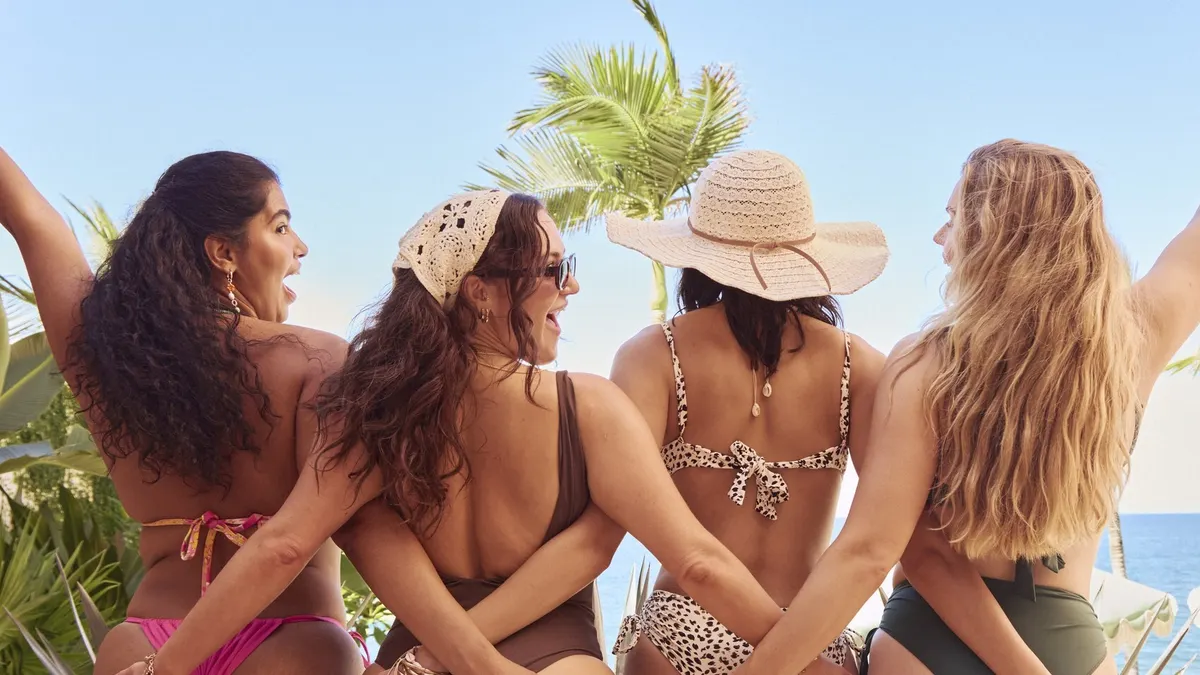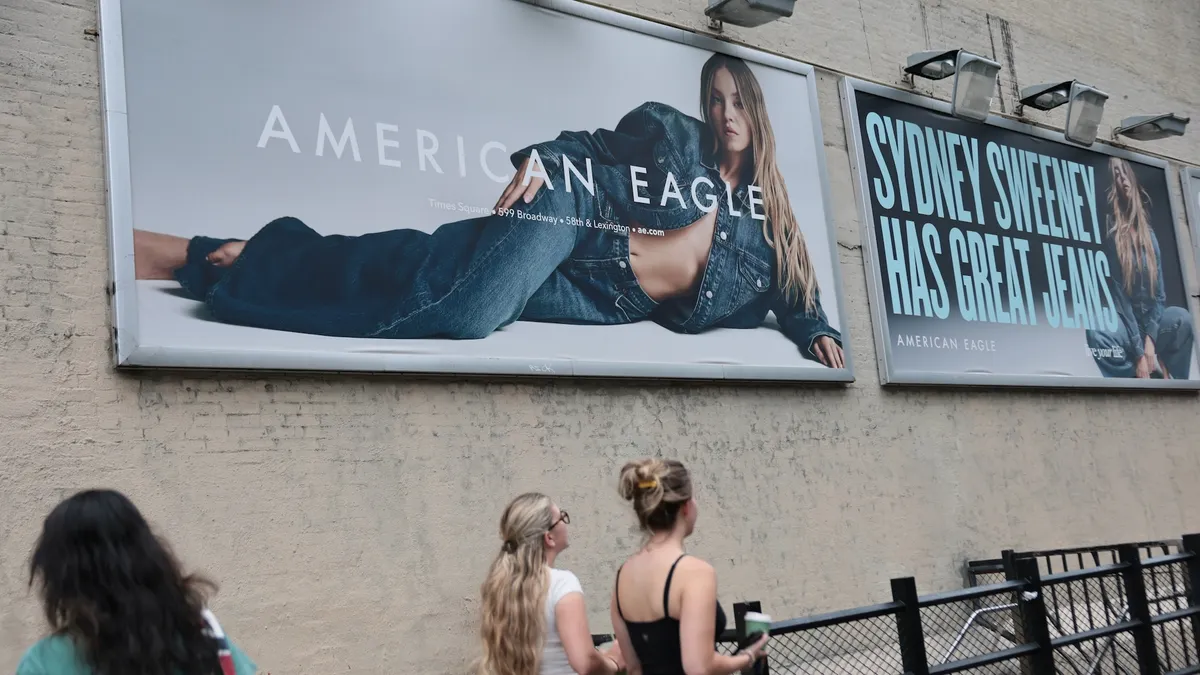Rtl doesn’t have quite the same ring as “retail.” Shppng, though, might communicate “shopping” just as well without some of its characters.
In a world where many company names have already been taken, brands are turning to strategies like spelling words incorrectly (Anthropologie), using fewer vowels (MoDRN) or cutting out vowels entirely (RTFKT) as they look for something unique to call their business. Part of the problem is domain names.
“It's really hard to find domain names. Every four-letter word, as well as five-letter word, is basically taken,” Jonah Berger, University of Pennsylvania Wharton professor and bestselling author of “Contagious: Why Things Catch On,” said. “And so brands are trying to figure out ways to both differentiate themselves, but also get access to domain names and trademarks and other sorts of things.”
According to Dr. Abhishek Pathak, who researches how sound symbolism impacts consumer perception, that situation is made worse by companies that buy up domain names purely to charge businesses exorbitant prices when they try to launch and find the domain is already taken. It’s easier, in some ways, to alter a well-known word and avoid any trademark or domain name issues.
But the naming strategy is more than purely logistics. Many of the first businesses to shorten their names and cut out vowels were tech startups, and so creating a short, snappy name potentially missing a vowel (Flickr, Tumblr) became associated with a certain type of cool.
“A lot of it started from pretty practical reasons and then I think there became an association with it of it being modern and smart,” Emmett Shine, co-founder of brand agency Gin Lane and multi-brand DTC company Pattern Brands, said. Shine’s Gin Lane worked with some of DTC’s most well-known brands, including Harry’s, Hims, Warby Parker and Everlane. Shine’s newer venture, Pattern Brands, is a growing collection of DTC home brands, which acquired towel company Onsen just last month.
“I think a potential downside is that there just becomes a time and place association, just like all brands that have ‘-ify’ at the end of them are associated with a certain era,” Shine added. “In three to five years, maybe you don't want your name to be so associated with a time or a place that maybe changes with perception as everyone kind of matures out of that one period.”
The ‘hidden languages’ of branding
Just like Shopify, Spotify and the other “-ify” brands Shine alluded to, there’s a history of companies cutting out vowels from their brand names and it’s not only related to necessity. Berger, for example, referenced electronic pop band MGMT, formed in the early 2000s, as a successful instance of a name without vowels. And once one group sees success with a certain brand name formula, others tend to follow.
“There was Napster and Friendster and Pixster and all those sorts of things,” Berger said. “Anytime there's a new way of doing things, there's often other companies and organizations that jump on the bandwagon.”
Brand names — whether they include misspellings, whether they’re uppercase, lowercase or vowelless — communicate to buyers about the audience they’re reaching. Shine noted fashion companies and musicians for years have defined their brands by using hyphens, dollar signs or even swapping in a Roman numeral V instead of an A, a language that holds an “inner circle exclusivity” to it.
Urban Outfitters’ bridal subrand BHLDN (pronounced “beholden”), for example, uses all capital letters in its logo, something which Shine said is more associated with fashion. Tech companies, on the other hand, often spell their names with all lowercase letters. (Urban Outfitters did not respond to a request for comment on why the company chose BHLDN as a name.)
"I think a lot of the dropping of letters is just another way to signal that you're a part of a specific community.”

Emmett Shine
Co-founder of Gin Lane and Pattern Brands
The language of branding and the signifiers of a certain group can be found just about everywhere. At the bookstore, covers for thrillers often feature the same bold colors and large all-caps font, while fantasy covers look far more whimsical. Shine similarly referenced an ad for a death metal concert, where the majority of the bands had black and white “neotraditional death metal logos.”
“My point of bringing that up is I think once you get into any world, there are hidden languages, which are meant to appeal to a specific audience and not necessarily any other audience,” Shine said. “And that could be dropping vowels, that could be going lowercase, that could be what became the ‘blanding’ aesthetic … I think a lot of the dropping of letters is just another way to signal that you're a part of a specific community.”
The lack of vowels can also signal a brand has certain characteristics. In a 2022 paper Pathak co-authored, he had consumers evaluate fake food brand names that included vowels and ones that did not: Those without vowels were considered more “rugged” by consumers, which could be good depending on what a brand is aiming to convey, but they were also read as less competent, less sophisticated and less sincere.
In fact, much of Pathak’s research has tied certain attributes of a word (whether it be sound, length or other elements) with different consumer associations. When it comes to length, for example, people tend to associate longer names with more luxury brands and shorter names with more basic brands. But that strategy may only be beneficial up to three or four syllables, according to a 2019 paper Pathak co-authored.
Yet another paper found that the number of “harsh” sounds in brand names can cause shoppers to associate the product itself with harshness or softness.
“By harshness, we mean for example, that a toilet cleaning product will be perceived as more astringent or effective at removing dirt if the brand name contains voiced obstruents whereas a skin moisturizing lotion would be perceived as softer on the skin if the brand name does not contain voiced obstruents,” the paper, written by Pathak, Gemma Anne Calvert and Lewis K. S. Lim, states.
"All the names that you see in the marketplace nowadays are those where when you drop vowels, the readability still exists."

Abhishek Pathak
Similarly, including or excluding vowels is a choice that will impact the immediate associations a shopper forms, for better or worse. And while it’s easy to tease the movement, brands are basing their decisions on trends that are working, at least for now.
“Stuff changes all the time and that's kind of the beauty of it. Maybe someone comes out with a horror book cover that is very markedly different, and it shifts the direction that horror book covers use for a while — [but] you'll never totally lose some of the elements that I think are core signifiers,” Shine said. “There are reasons why restaurants are certain colors, reasons why galleries are certain colors, why airports have glass — everything has base logic to it.”
And when it comes to vowelless phrases, the age of social media and texting has normalized the shortening of everyday words into acronyms or smaller phrases. “Pls,” for example, has become commonplace for “please,” or “sry” for “sorry.” Retailers adopting vowelless names, therefore, could be targeting younger audiences that are more familiar with shortened lingo, Pathak said. But that doesn’t mean anything goes.
“If you look at it, all the names that you see in the marketplace nowadays are those where when you drop vowels, the readability still exists,” Pathak said. “Like ‘srsly’ — when you write ‘seriously’ without the vowels, you can still read the name.”

The ‘special meaning’ of vowels
On the other side of the spectrum are names that are less obvious to pronounce: BHLDN, for example. Or RTFKT — one of Nike’s more recent acquisitions. The name could be a stand-in for “artifact” but it takes a mental leap to get there. (Nike did not respond to questions about the name’s origins.)
“Looking at MNML, for example — well, I think that's ‘minimal.’ But I'm not sure that that's minimal. I have to wonder how to pronounce it,” Berger said. “Now, in some ways, that's certainly bad because people don't know how to pronounce your name. On the other hand, it does make people feel sort of cool and in the know to know what it is and know how to do it correctly.
Where that strategy can falter is in brand awareness and discoverability. A name without vowels may be more difficult for consumers to find, especially if they search the name phonetically. A misspelled URL could lead shoppers to a different site entirely, and brands could incur more costs buying out adjacent URLs
“People are here to poach your space,” Pathak said.
A slightly less serious consequence is that an alternate pronunciation of the name could gain steam with consumers, taking away the brand’s intended meaning. As an example, Pathak pointed to South Korean musician “Psy,” whose name some fans pronounce as “P-S-Y.”
And while a difficult-to-pronounce name can bestow a cool factor on those who are part of the “in” crowd, psychologically, there are other factors to consider.
“Consumers associate any new thing with how easy it is to process — and there's literature, which says that, if it is difficult to process, it will be negative. For example, if there's a name of a drug or a medicine, which is difficult to pronounce, people normally think that it will not be effective at all,” Pathak said. “If it is easy to pronounce, people think yeah, it will have some effect.”
When Pathak tested consumer reactions to brand names with and without vowels, respondents were more likely to think negatively of the made-up brand names without vowels, including on product traits like price, quality and health. Certain vowel sounds are also responsible for positive associations, which companies could lose by cutting them out.
“I don't think Tumblr became Tumblr because they dropped the ‘e.’"

Emmett Shine
Co-founder of Gin Lane and Pattern Brands
A brand name might still be readable with consonants only, but vowels “provide the acoustic cues, melody, and prosody within speech,” according to a 2021 paper by Pathak and Calvert. Long vowels — for example in the word “deep” — have a uniquely positive association.
“Long vowels are almost always the first sounds produced by babies and are believed to be melodious, and hence widely used by poets and writers alike as euphonic tools,” Pathak and Calvert wrote. “It seems plausible, therefore, that the inclusion of long vowel sounds in brands’ names would enhance their pleasantness and modulate expectations of their corresponding products in predictable ways.”
In a series of studies, the authors found consumers associated sweetness “significantly more” with brand names including long vowels than with ones containing short vowels. Long vowels also frequently appear in lullabies, according to Pathak, or in romantic phrases in certain languages.
“All these sounds hold a special meaning for the consumer,” Pathak said.
To put it simply, naming a brand is complex. The practical considerations of SEO and domain availability are just the surface of a very layered issue. It’s up to brands to wade through the hidden languages, the special meanings, the unconscious associations, that pervade the world of words, and to choose which factors hold the most weight.
“I think at the end of the day, there's a lot of OK brands with great names and a lot of great brands with OK names,” Shine said. “I don't think Tumblr became Tumblr because they dropped the ‘e.’ I think it was for the service at the time and what it was offering. Similarly, I don't think Spotify became the dominant global streaming platform for music by just adding ‘-ify’ to it.”
























